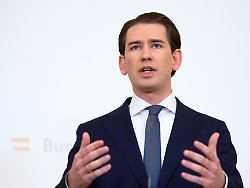Saturday, October 9th, 2021
Shortly it wants to be painless
“Country is more important to me than myself”
By Marko Schlichting
The Austrian Chancellor Sebastian Kurz resigns after allegations of corruption. But if you follow the initial reactions of the opposition parties, that is not enough. There is also mistrust among the coalition partners.
There are first indications of the impending bang in Austria’s latest political drama on Saturday evening around half past six. The Austrian news agency APA reports that Chancellor Sebastian Kurz will resign, but not properly. It literally means that Kurz wants to “step aside”.
7.40 p.m.: Briefly appear in front of the press. It will be a short statement. Questions are not allowed. He says he has done a very successful job with the ÖVP in recent years. But now there are investigations against him. “I want to make room now to ensure stability and prevent chaos,” he says. The allegations against him are baseless, but “The country is now more important than the person”.
The Christian-Social Austrian People’s Party (ÖVP) will initially continue to form a government with the Greens. Alexander Schallenberg, who was born in Bern, is to become the new chancellor. He was previously foreign minister. “He has the diplomatic skills that it takes to rebuild trust,” Kurz said in his statement.
Kurz himself becomes a member of the Nationalrat, the Austrian parliament. There he wants to become parliamentary group leader of his party. In Austria this is called the club chairman. Austria’s Vice Chancellor, Minister of Culture Joseph Kogler of the Greens, welcomes Kurz’s resignation. The Greens want to continue to govern with the ÖVP.
First criticism from the FPÖ
Kurz’s resignation preceded a motion of censure, which the other parties represented in the National Council had agreed on yesterday and which the Greens, the opposition partner of the ÖVP, also wanted to support.
How it should go on is not clear. For example, the head of the liberal NEOS, Beate Meinl-Reisinger, had proposed a “concentration government” in which all opposition parties should be involved – including the right-wing FPÖ. The SPÖ then called this a “crazy idea”. Kurz also wanted to prevent something like that, he says in his statement. Especially because of the participation of the FPÖ.
Their party leader Herbert Kickl is the first to criticize Sebastian Kurz’s move. According to ORF, he says that Kurz still enjoys political immunity and that the investigation against him would be difficult. Kurz has since announced that he would apply for his parliamentary immunity to be lifted next week.
Investigations against Kurz
The reason for the resignation of the Austrian Chancellor are allegations of corruption against him. He is said to have commissioned manipulated survey results from an opinion research institute, which most of Austria’s media had used. The relevant surveys were financed with taxpayers’ money. They are said to have served to put the ÖVP in a better light. This is how he influenced the National Council elections four years ago. The ÖVP had clearly won it and then formed a government coalition with the FPÖ. This was the beginning of Sebastian Kurz’s chancellorship.
It was the climax so far of the rise of the Austrian, who was the youngest Chancellor of his country to date – an ascent that should have come to an end on Saturday evening.
